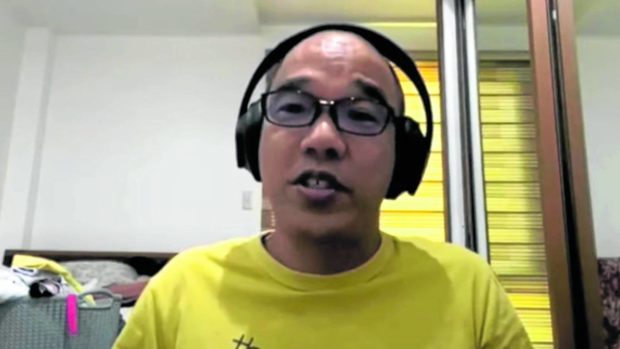
The Senate on Friday, Nov. 5, 2021, ordered the arrest of former Budget Undersecretary Lloyd Christopher Lao on a contempt citation after he failed to show up at the Senate blue ribbon inquiry without a valid excuse four consecutive times. (Screengrab from PTV)
MANILA, Philippines — The Procurement Service of the Department of Budget and Management (PS-DBM) has removed pandemic supplies from its list of “common-use” items that it began purchasing at the onset of the COVID-19 contagion in 2020.
The PS-DBM became the focus of a major Senate investigation of alleged irregularities in its use of P42 billion in pandemic response funds from the Department of Health (DOH) and the procurement agency’s alleged favoritism for the undercapitalized Pharmally Pharmaceutical Corp. as the major medical supplier.
The Senate inquiry also found that some of the pandemic supplies procured by the PS-DBM were allegedly overpriced.
A Jan. 13 PS-DBM advisory said it had delisted the following from its supplies and equipment catalog: personal protective equipment (PPE), gloves, masks (except surgical masks for office use), testing kits, common medicines (such as paracetamol tablet and suspension, mefenamic acid, vitamins tablet and suspension, hyoscine tablet and suspension, oral rehydration solution, and cetirizine tablet and suspension), povidone iodine, sodium hydrochloride, and thermometers.
It said that the delisted goods could no longer be purchased from its virtual store.
Big-ticket contracts
The PS-DBM, which used to be headed by former Budget Undersecretary Lloyd Christopher Lao, who is now wanted by the Senate, did not explain why it delisted these items effective Jan. 7.
The budget department agency was created during the Marcos regime to centralize procurement of common-use supplies in order to remove the burden of making numerous small-item purchases on government agencies so that their bids committees could focus on big-ticket contracts.
Common-use items include equipment and materials being used by government agencies in their day-to-day office operations, such as paper, computers, printers, pens, and pencils. In 2019, the DBM added motor vehicles to the list.
Officials of the DBM and the interagency Government Procurement Policy Board (GPPB) have not responded to the Inquirer’s request since Friday for comment and elaboration on the delisting.
But last year, the PS-DBM reminded the GPPB that it had the authority to delist “items that it deems to be no longer relevant with respect to the needs of the agencies.”
GPPB documents showed that in August 2021, the board received a letter from the PS-DBM endorsing the DOH request to delist the items that were eventually removed this month. The Senate inquiry opened that month.
The GPPB said that the DOH requested the reclassification of the pandemic supplies “to regular or noncommon-use items so that the DOH and other health facilities can procure these commodities on their own considering that these items are regularly used in health facilities.”
The PS-DBM did not oppose the request for delisting, but proposed to retain face masks for office use because several government agencies were still purchasing and inquiring about their availability, the GPPB said.
In the early days of the pandemic, DOH officials had recommended classifying masks and PPE, among other health- and medical-related equipment, as common-use supplies whose procurement the PS-DBM could expedite.
Volume procurement
The DOH had said it needed to purchase in bulk a wide array of health and medical supplies to immediately respond to the spread of COVID-19 at that time. The health officials deemed it proper to give the responsibility to the PS-DBM given its expertise in large volume procurement.
The centralized procurement of such items was approved by the GPPB, which issued guidelines, especially during the implementation of the Bayanihan 1 and 2 laws.
The government did away with usually more stringent procurement processes and had allowed negotiated bids and contracts to speed up transactions during the health emergency.
‘Overpricing’
Some legislators and critics had lambasted the DOH for passing this responsibility to the PS-DBM, saying the procurement agency did not have the technical expertise to buy medical-grade supplies.
A number of senators also questioned the centralized pandemic procurement, which they alleged may have led to overpricing or some favored companies making huge profits at the height of a public health crisis.
GPPB data showed that during the implementation of Bayanihan 1 and 2 in 2020, the PS-DBM was the procuring entity with the biggest amount of awarded contracts, totaling over P21 billion, at the least.
Pharmally, with a paid-up capital of only P625,000, won an initial P8.7 billion worth of contracts from the PS-DBM, taking the lion’s share of government purchases of pandemic supplies that year.
In comparison, Xuzhou Construction Machinery Group, the next biggest contractor, was awarded P1.9 billion followed by Phil Pharma Wealth Inc. with P1.7 billion and Hafid N’ Erasmus Corp. with P892.7 million.
Senators later learned that President Duterte’s Chinese friend and former economic adviser Michael Yang provided a loan to the cash-strapped Pharmally.
Contempt charges
The Davao-based businessman denied this, saying he only linked company officials to his Chinese friends and suppliers.
The Senate had detained three senior Pharmally officials on contempt charges for their alleged non-cooperation with the ongoing inquiry.
The Senate last year issued an arrest warrant for Lao, the former PS-DBM head, for failing to attend the blue ribbon committee hearings on the alleged irregularities in the procurement of pandemic supplies.